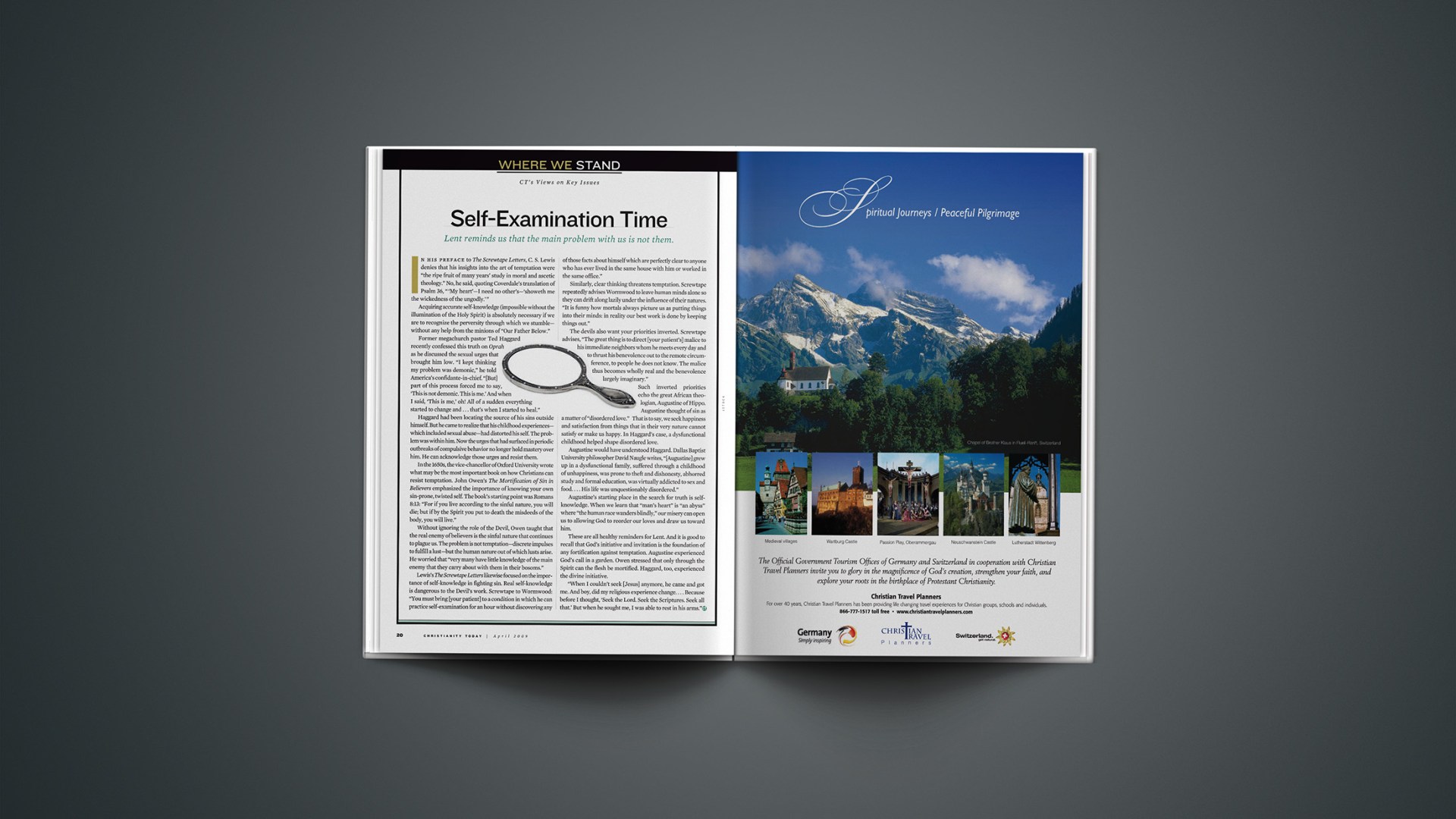In his preface to The Screwtape Letters, C. S. Lewis denies that his insights into the art of temptation were “the ripe fruit of many years’ study in moral and ascetic theology.” No, he said, quoting Coverdale’s translation of Psalm 36, ” ‘My heart’—I need no other’s—’showeth me the wickedness of the ungodly.’ “
Acquiring accurate self-knowledge (impossible without the illumination of the Holy Spirit) is absolutely necessary if we are to recognize the perversity through which we stumble—without any help from the minions of “Our Father Below.”
Former megachurch pastor Ted Haggard recently confessed this truth on Oprah as he discussed the sexual urges that brought him low. “I kept thinking my problem was demonic,” he told America’s confidante-in-chief. “[But] part of this process forced me to say, ‘This is not demonic. This is me.’ And when I said, ‘This is me,’ oh! All of a sudden everything started to change and… that’s when I started to heal.”
Haggard had been locating the source of his sins outside himself. But he came to realize that his childhood experiences—which included sexual abuse—had distorted his self. The problem was within him. Now the urges that had surfaced in periodic outbreaks of compulsive behavior no longer hold mastery over him. He can acknowledge those urges and resist them.
In the 1650s, the vice-chancellor of Oxford University wrote what may be the most important book on how Christians can resist temptation. John Owen’s The Mortification of Sin in Believers emphasized the importance of knowing your own sin-prone, twisted self. The book’s starting point was Romans 8:13: “For if you live according to the sinful nature, you will die; but if by the Spirit you put to death the misdeeds of the body, you will live.”
Without ignoring the role of the Devil, Owen taught that the real enemy of believers is the sinful nature that continues to plague us. The problem is not temptation—discrete impulses to fulfill a lust—but the human nature out of which lusts arise. He worried that “very many have little knowledge of the main enemy that they carry about with them in their bosoms.”
Lewis’s The Screwtape Letters likewise focused on the importance of self-knowledge in fighting sin. Real self-knowledge is dangerous to the Devil’s work. Screwtape to Wormwood: “You must bring [your patient] to a condition in which he can practice self-examination for an hour without discovering any of those facts about himself which are perfectly clear to anyone who has ever lived in the same house with him or worked in the same office.”
Similarly, clear thinking threatens temptation. Screwtape repeatedly advises Wormwood to leave human minds alone so they can drift along lazily under the influence of their natures. “It is funny how mortals always picture us as putting things into their minds: in reality our best work is done by keeping things out.”
The devils also want your priorities inverted. Screwtape advises, “The great thing is to direct [your patient’s] malice to his immediate neighbors whom he meets every day and to thrust his benevolence out to the remote circumference, to people he does not know. The malice thus becomes wholly real and the benevolence largely imaginary.”
Such inverted priorities echo the great African theologian, Augustine of Hippo. Augustine thought of sin as a matter of “disordered love.” That is to say, we seek happiness and satisfaction from things that in their very nature cannot satisfy or make us happy. In Haggard’s case, a dysfunctional childhood helped shape disordered love.
Augustine would have understood Haggard. Dallas Baptist University philosopher David Naugle writes, “[Augustine] grew up in a dysfunctional family, suffered through a childhood of unhappiness, was prone to theft and dishonesty, abhorred study and formal education, was virtually addicted to sex and food.… His life was unquestionably disordered.”
Augustine’s starting place in the search for truth is self-knowledge. When we learn that “man’s heart” is “an abyss” where “the human race wanders blindly,” our misery can open us to allowing God to reorder our loves and draw us toward him.
These are all healthy reminders for Lent. And it is good to recall that God’s initiative and invitation is the foundation of any fortification against temptation. Augustine experienced God’s call in a garden. Owen stressed that only through the Spirit can the flesh be mortified. Haggard, too, experienced the divine initiative.
“When I couldn’t seek [Jesus] anymore, he came and got me. And boy, did my religious experience change.… Because before I thought, ‘Seek the Lord. Seek the Scriptures. Seek all that.’ But when he sought me, I was able to rest in his arms.”
Copyright © 2009 Christianity Today. Click for reprint information.
Related Elsewhere:
More editorials are available on our site. Christianity Today has a special section on Lent.










